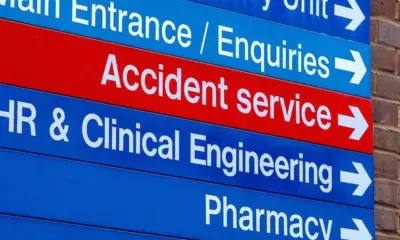Health
Scientists Push for Cancer Warnings on Processed Meat Labels

Scientists are advocating for cigarette-style warnings on bacon and ham sold in the UK, asserting that chemicals in these processed meats are linked to bowel cancer. This demand coincides with criticisms of British government inaction over the past decade, following the World Health Organization’s (WHO) declaration in October 2015 that processed meat is carcinogenic to humans.
The WHO’s classification placed processed meats in the same risk category as tobacco and asbestos. Nitrites, which are added during the curing process to enhance color and preservation, have been identified as harmful. Experts estimate that inaction regarding nitrites has led to around 54,000 cases of bowel cancer in the UK, costing the National Health Service (NHS) approximately £3 billion.
Calls for Action from Experts
Four scientists involved in the WHO’s International Agency for Research on Cancer (IARC) report, along with other experts, have written to Wes Streeting, the UK Health Secretary. They are urging him to implement stronger regulations to mitigate the risks associated with nitrites. The scientists recommend that the estimated 90% to 95% of bacon and ham packages containing these chemicals display clear warnings. They also suggest phasing out nitrites from processed meats over the coming years.
“Consumers deserve clear information,” stated Denis Corpet, an emeritus professor of food safety and nutrition at Toulouse University. “Most people don’t realize that the WHO classifies nitrite-cured meats like bacon and ham in the same carcinogenic category as tobacco and asbestos.” He emphasized the responsibility of ministers to protect public health and reduce the risk of bowel cancer linked to these products.
The IARC noted in 2015 that consuming just 50 grams of processed meat daily is associated with an 18% increased risk of colorectal cancer. This alarming statistic underscores the urgency for regulatory changes.
Diverse Perspectives on Public Health Measures
The World Cancer Research Fund (WCRF) also recognizes the dangers of processed meat consumption. Kate Oldridge-Turner, the charity’s head of policy and public affairs, stated, “There is clear evidence that consuming processed meat increases the risk of colorectal cancer.” While she refrained from supporting the call for warning labels, she advocated for dietary guidelines that emphasize limited processed meat consumption and the promotion of healthier food options, particularly in public settings like schools.
Prof Chris Elliott, a former government adviser on food safety and a signatory of the letter to Streeting, criticized the lack of action over the past decade. He pointed out that the continued presence of nitrites in processed meats poses an ongoing health risk. “Every year of delay means more preventable cancers, more families affected, and greater strain on the NHS,” he said.
The UK Department of Health and Social Care has been approached for a response regarding these demands, but no comments have been made public as of yet. The growing chorus of voices urging for change reflects a significant concern for public health and the need for transparency in food labeling.
-

 Entertainment3 months ago
Entertainment3 months agoAnn Ming Reflects on ITV’s ‘I Fought the Law’ Drama
-

 Entertainment4 months ago
Entertainment4 months agoKate Garraway Sells £2 Million Home Amid Financial Struggles
-

 Health2 months ago
Health2 months agoKatie Price Faces New Health Concerns After Cancer Symptoms Resurface
-

 Entertainment3 months ago
Entertainment3 months agoCoronation Street’s Carl Webster Faces Trouble with New Affairs
-

 Entertainment2 months ago
Entertainment2 months agoWhere is Tinder Swindler Simon Leviev? Latest Updates Revealed
-

 Entertainment4 months ago
Entertainment4 months agoMarkiplier Addresses AI Controversy During Livestream Response
-

 Science4 weeks ago
Science4 weeks agoBrian Cox Addresses Claims of Alien Probe in 3I/ATLAS Discovery
-

 Entertainment4 months ago
Entertainment4 months agoKim Cattrall Posts Cryptic Message After HBO’s Sequel Cancellation
-

 Entertainment2 months ago
Entertainment2 months agoOlivia Attwood Opens Up About Fallout with Former Best Friend
-

 Entertainment3 months ago
Entertainment3 months agoMasterChef Faces Turmoil as Tom Kerridge Withdraws from Hosting Role
-

 Entertainment4 months ago
Entertainment4 months agoSpeculation Surrounds Home and Away as Cast Departures Mount
-

 World2 months ago
World2 months agoCole Palmer’s Mysterious Message to Kobbie Mainoo Sparks Speculation





















